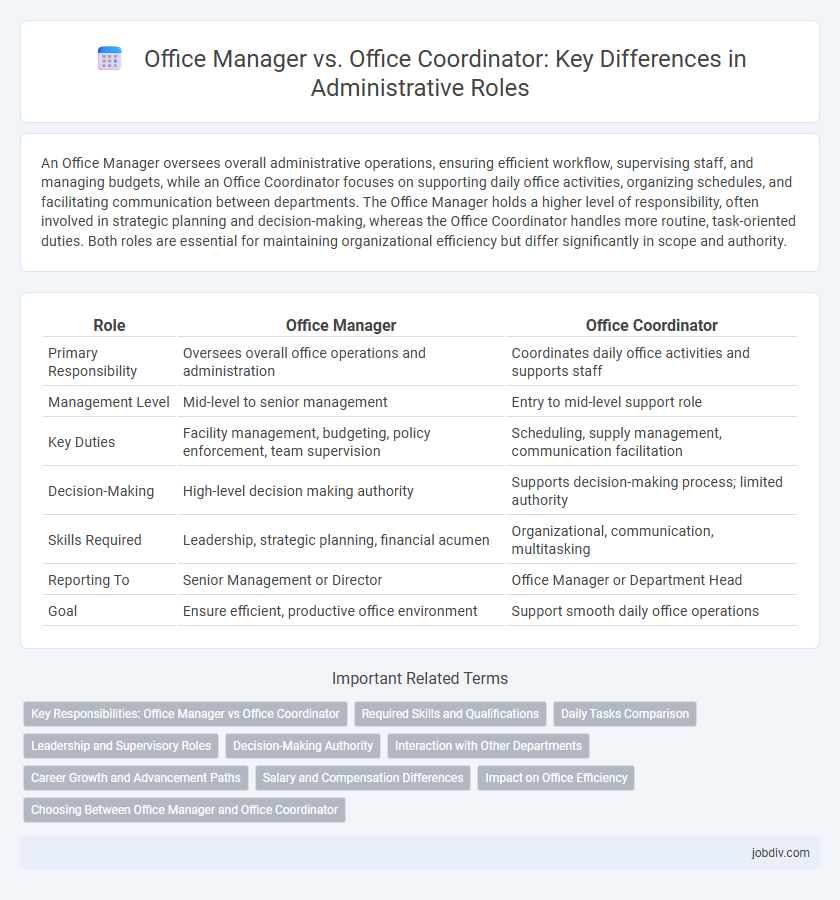An Office Manager oversees overall administrative operations, ensuring efficient workflow, supervising staff, and managing budgets, while an Office Coordinator focuses on supporting daily office activities, organizing schedules, and facilitating communication between departments. The Office Manager holds a higher level of responsibility, often involved in strategic planning and decision-making, whereas the Office Coordinator handles more routine, task-oriented duties. Both roles are essential for maintaining organizational efficiency but differ significantly in scope and authority.
Table of Comparison
| Role | Office Manager | Office Coordinator |
|---|---|---|
| Primary Responsibility | Oversees overall office operations and administration | Coordinates daily office activities and supports staff |
| Management Level | Mid-level to senior management | Entry to mid-level support role |
| Key Duties | Facility management, budgeting, policy enforcement, team supervision | Scheduling, supply management, communication facilitation |
| Decision-Making | High-level decision making authority | Supports decision-making process; limited authority |
| Skills Required | Leadership, strategic planning, financial acumen | Organizational, communication, multitasking |
| Reporting To | Senior Management or Director | Office Manager or Department Head |
| Goal | Ensure efficient, productive office environment | Support smooth daily office operations |
Key Responsibilities: Office Manager vs Office Coordinator
Office Managers oversee overall office operations, including staff management, budgeting, schedule coordination, and implementing office policies to ensure efficient workflow. Office Coordinators primarily handle administrative support tasks such as managing communications, organizing meetings, maintaining records, and coordinating office supplies. The Office Manager's role is more strategic and leadership-focused, while the Office Coordinator emphasizes task execution and organizational support.
Required Skills and Qualifications
Office Managers must possess strong leadership, advanced organizational skills, and proficiency in project management software, often requiring a bachelor's degree in business administration or related fields. Office Coordinators need excellent communication abilities, multitasking skills, and familiarity with office software, with qualifications typically including a high school diploma or associate degree. Both roles demand problem-solving capabilities and experience in administrative support, but Office Managers generally require higher-level strategic planning skills and supervisory experience.
Daily Tasks Comparison
Office Managers oversee overall administrative operations, including supervising staff, managing budgets, and ensuring workflow efficiency, while Office Coordinators handle specific daily tasks such as scheduling meetings, organizing files, and maintaining office supplies. The Office Manager typically develops office policies and coordinates between departments, whereas the Office Coordinator supports these processes by executing routine activities and facilitating communication. Both roles are essential for smooth office functionality, but the Office Manager has broader strategic responsibilities compared to the more task-focused role of the Office Coordinator.
Leadership and Supervisory Roles
Office Managers typically hold higher leadership responsibilities, overseeing administrative staff and ensuring office operations align with organizational goals. Office Coordinators focus on implementing procedures and coordinating daily office activities under the guidance of Office Managers. The supervisory role is more pronounced in Office Managers, who handle performance evaluations and strategic decision-making for administrative teams.
Decision-Making Authority
Office Managers generally hold higher decision-making authority, overseeing daily operations, managing budgets, and implementing company policies. Office Coordinators typically support these processes with task coordination and communication but have limited authority in strategic decisions. Clear role delineation ensures efficient workflow and accountability within administrative teams.
Interaction with Other Departments
Office Managers oversee cross-departmental communication to ensure smooth operations, often making higher-level decisions that impact multiple teams. Office Coordinators facilitate daily interactions by scheduling meetings, managing information flow, and supporting specific departmental needs. Both roles require strong interpersonal skills but differ in scope, with Office Managers engaging in strategic collaboration and Office Coordinators handling operational support.
Career Growth and Advancement Paths
Office Managers typically have broader responsibilities overseeing administrative operations, which positions them for senior management roles such as Operations Manager or Facilities Director. Office Coordinators often start with task-oriented duties that can lead to specialized administrative roles like Project Coordinator or Executive Assistant. Career growth for Office Managers generally involves strategic leadership development, while Office Coordinators advance through experience and skill specialization.
Salary and Compensation Differences
Office Managers typically earn higher salaries than Office Coordinators due to broader responsibilities and leadership roles within administration, with average annual pay ranging from $50,000 to $70,000 compared to $35,000 to $50,000 for Coordinators. Compensation packages for Office Managers often include performance bonuses, health benefits, and retirement plans, reflecting their increased accountability and decision-making duties. Office Coordinators generally receive standard benefits and hourly wages, emphasizing operational support rather than strategic management.
Impact on Office Efficiency
Office Managers oversee overall administrative operations, optimizing workflow through strategic planning, resource allocation, and team leadership, significantly enhancing office efficiency. Office Coordinators handle daily administrative tasks and communication, ensuring smooth execution of routine processes and supporting team productivity. The combined roles create a structured environment that streamlines operations and minimizes downtime in an office setting.
Choosing Between Office Manager and Office Coordinator
Choosing between an Office Manager and an Office Coordinator depends on the organization's size and operational complexity; an Office Manager typically oversees overall office functions including budgeting, staff supervision, and policy implementation, making them ideal for larger companies requiring strategic leadership. In contrast, an Office Coordinator focuses on day-to-day administrative support, scheduling, and communication tasks, fitting smaller businesses needing efficient task execution. Evaluating organizational needs, role responsibilities, and management hierarchy helps determine the best fit for optimizing office administration.
Office Manager vs Office Coordinator Infographic

 jobdiv.com
jobdiv.com